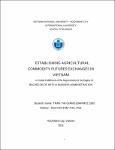| dc.description.abstract | The agricultural commodity futures exchanges have been grown in recent years,
particularly in emerging markets. Vietnam, as an emerging market, has a large
agricultural potential but also involve many risks cannot hedge.Thus, three commodity
exchanges, including VNX, BCCE and INFO have been established in order to develop
market and protect the interests of agricultural sectors, especially rural farmers. However,
those have shown unsuccessful operation with low trading volume and illiquidity.
This thesis tries to explore the problems causing unsuccessful operation of three
existing commodity exchanges in Vietnam and suggests some solutions based on the
experiences of others countries while using qualitative methods as the main methodology.
Firstly, the study reviewed some previous literatures in other to build a framework of an
agricultural commodity futures exchange as well as gain experiences fromother countries.
Secondly, the interview was carried out indicating the present situations as well as problems
of commodity exchanges in Vietnam. The sample for interview method was fifteen.
Specifically, ten farmer households andrepresentatives of two companies, producing raw
coffee in DakLak, two experts in coffee field as well as one expert about commodity
exchanges.
As one of the main findings of this research, the failures of commodity exchanges in
Vietnam have arisen from the lack of basics prerequisites, includingrobust laws and
regulations, developed infrastructures (warehouses, clearing house, technology, delivery),
efficient financing warehouse systems as well as effective training and education programs.
Based on the experiences and lessons from other countries around the world, the
study suggests that Vietnam should step by step to establish commodity futures exchange.
Specifically, after building robust laws and regulations, Vietnam should initially offer trade
in less sophisticated instrument than futures contracts, such as spot trading or forward
trading. In addition, the infrastructures, including credit warehouse systems, delivery,
grading systems as well as technology and clearing houses should be improved andxii
developed in parallel with market growth. Finally, the government and promoters should
study effective training programs in order to provide participants, especially rural farmers
with knowledge and information about commodity exchange and futures market. | en_US |


